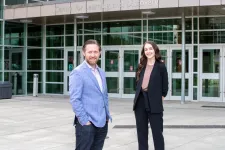Young adult cancer survivors reluctant to get COVID vaccines
2021-06-29
(Press-News.org) A new paper in JNCI Cancer Spectrum, published by Oxford University Press, indicates that many survivors of adolescent and young adult cancers hesitate to obtain COVID-19 vaccinations.
As of March 2021, there were over 33 million cases and 580,000 deaths from COVID in the United States. Vaccines offer the best hope to control the spread of COVID-19. Some 20%-40% of the US population, however, is hesitant to obtain COVID-19 vaccination. Cancer survivors often have weakened immune systems and are more likely to develop severe respiratory infections, making them particularly vulnerable to the threat of COVID-19.
National organizations recommend strongly that cancer survivors receive the COVID-19 vaccine. Cancer survivors are a priority vaccination group.
Researchers involved in the study aimed to identify sociodemographic factors associated with COVID-19 vaccine hesitancy among adolescent and young adult cancer survivors. Eligible participants were 18 years or older, diagnosed with cancer between the ages of 15 and 39, and received services through an adolescent and young adult cancer care program run by Huntsman Cancer Institute at the University of Utah and Intermountain Healthcare.
A total of 342 participants completed a cross-sectional survey. While 62.9% intended to get the COVID-19 vaccine, over one-third (37.1%) expressed COVID-19 vaccine hesitancy. Female survivors and survivors with a high school education or less reported greater vaccine hesitancy compared to their male or college graduate counterparts.
Some 42% of female young adult cancer survivors in the study indicated vaccine hesitancy (vs. 30.1% of males). Survivors with high school education or less had 3.15 times higher odds of reporting COVID-19 vaccine hesitancy compared to college graduates. Of Hispanic participants, 52.9% exhibited vaccine hesitancy, while 31.6% of White participants reported such hesitancy.
"As life returns to some resemblance of normal, receiving the COVID-19 vaccine is as important as ever," said Austin Waters, who led the study with a research team. "Cancer survivors should not wait to get the COVID-19 vaccine. Oncology care providers and cancer centers should play an important role in encouraging young survivors to receive the vaccine. To ensure equitable protection of vulnerable populations, special attention should be paid to vaccine hesitancy among at risk groups such as young adult cancer survivors and groups that may have higher vaccine hesitancy such as female survivors or those with a high school education or less."
The paper "COVID-19 Vaccine Hesitancy Among Adolescent and Young Adult Cancer Survivors" is available (at midnight on June 29th) at: https://doi.org/10.1093/jncics/pkab049
INFORMATION:
Direct correspondence to:
Austin R. Waters
Huntsman Cancer Institute, University of Utah
2000 Circle of Hope
Salt Lake City, UT 84112
Austin.waters@hci.utah.edu
To request a copy of the study, please contact:
Daniel Luzer
daniel.luzer@oup.com
ELSE PRESS RELEASES FROM THIS DATE:
2021-06-29
According to the World Health Organization, about 785 million people around the world lack a clean source of drinking water. Despite the vast amount of water on Earth, most of it is seawater and freshwater accounts for only about 2.5% of the total. One of the ways to provide clean drinking water is to desalinate seawater. The Korea Institute of Civil Engineering and Building Technology (KICT) has announced the development of a stable performance electrospun nanofiber membrane to turn seawater into drinking water by membrane distillation process.
Membrane wetting is the most challenging ...
2021-06-29
CORVALLIS, Ore. - Research by a graduate student in Oregon State University's College of Science has upended the conventional wisdom that for a century has incorrectly guided the study of a toad listed as endangered in part of its range.
Anne Devan-Song used spotlighting - shining a light in a dark spot and looking for eye reflections - to find large numbers of the eastern spadefoot toad. The study illustrates how confirmation bias - a tendency to interpret new information as ratification of existing theories - can hamper discovery and the development of better ones.
Her findings, which show that the toad spends much more time above ground than commonly believed, were published in the Journal ...
2021-06-29
Chestnut Hill, Mass. (6/29/2021) -- A new, first-of-its-kind study led by researchers from Boston College has found that personal networks in India could play an important role in advancing the adoption of a cleaner cooking fuel, in this case liquefied petroleum gas, according to a report published in the journal Environmental Research Letters.
"This is the first report in clean cooking research to show that just like with tobacco use, obesity, or physical activity -- where our networks play a role in shaping our behaviors and decisions -- we find that personal networks are also associated with what kinds of stoves rural poor use.," said study co-author ...
2021-06-29
The tiny mouse embryo has a heart that beats. Its muscles, blood vessels, gut and nervous system are beginning to develop. But this embryo is unusual: It was made in a lab, out of mouse embryonic stem cells, and represents the most sophisticated in vitro (in a dish) model of a mammal ever so created.
This new model, developed at the University of Virginia School of Medicine by Christine and Bernard Thisse, is a major step forward in scientists' efforts to mimic the natural development of a mammal by using stem cells. Its existence is a wonder that will help scientists understand mammalian development, battle diseases, create new drugs and, eventually, grow tissues and organs for people in need of transplants.
"We found a way to instruct aggregates of stem cells to initiate ...
2021-06-29
Immunologists at McMaster University have discovered a previously unknown mechanism which acts like a spider web, trapping and killing pathogens such as influenza or SARS-CoV-2, the virus responsible for COVID-19.
The researchers have found that neutrophils, the most abundant white blood cells in the human body, explode when they bind to such pathogens coated in antibodies and release DNA outside of the cell, creating a sticky tangle which acts as a trap.
The findings, published online in the Proceedings of the National Academy of Science, are significant because little is understood about how antibodies neutralize viruses in the respiratory tract.
The discovery has ...
2021-06-29
One of the key mutations seen in the 'Alpha variant' of SARS-CoV-2 - the deletion of two amino acids, H69/V70 - enables the virus to overcome chinks in its armour as it evolves, say an international team of scientists.
SARS-CoV-2 is a coronavirus, so named because spike proteins on its surface give it the appearance of a crown ('corona'). The spike proteins bind to ACE2, a protein receptor found on the surface of cells in our body. Both the spike protein and ACE2 are then cleaved, allowing genetic material from the virus to enter the host cell. The virus manipulates the host cell's machinery to allow the virus to replicate and spread.
As SARS-CoV-2 ...
2021-06-29
A conclusive narrative review has found physical punishment of children is not effective in preventing child behavior problems or promoting positive outcomes and instead predicts increases in behavior problems and other poor outcomes over time. The study by an international group of scientists including a researcher from The University of Texas at Austin was published today in The Lancet.
Caregivers in many parts of the world use physical punishment as a response to children's perceived misbehavior: 63% of children between the ages of 2 and 4 worldwide - approximately 250 million children - are regularly subjected ...
2021-06-29
Phase 1/2 clinical trial of CoronaVac in 550 children and adolescents aged 3-17 years in China suggests two doses of the vaccine are safe and generate a strong antibody response.
First published data on safety and immune response generated by a COVID-19 vaccine in children as young as 3-years-old supports use of CoronaVac - which was recently approved for emergency use in China among children over 3-years-old - in further studies to inform immunisation strategies.
Two doses of CoronaVac are safe and provoke a strong antibody response among children and adolescents ...
2021-06-29
In first-of-its kind research led by a University of Massachusetts Amherst psychotherapy researcher, mental health care patients matched with therapists who had a strong track record of treating the patients' primary concerns had better results than patients who were not so matched.
In addition, this "match effect" was even more beneficial and pronounced for patients with more severe problems and for those who identified as racial or ethnic minorities.
The findings are published in JAMA Psychiatry and the Journal of Consulting and Clinical Psychology.
"One of the things we've been learning in our field ...
2021-06-29
PULLMAN, Wash. - A research team led by Washington State University has created a computer model to understand how plants store energy in the thylakoid membrane, a key structure to photosynthesis in plant leaves.
The team confirmed the accuracy of the mathematical model with lab experiments. Their work was recently published in the journal Nature Plants.
"We provided an important piece to the overall puzzle of plant metabolism," said Helmut Kirchhoff, a professor in WSU's Institute of Biological Chemistry and leader of the team who made this discovery. "If we integrate our model into the bigger picture, it may provide a good path for how to improve plants for ...
LAST 30 PRESS RELEASES:
[Press-News.org] Young adult cancer survivors reluctant to get COVID vaccines




